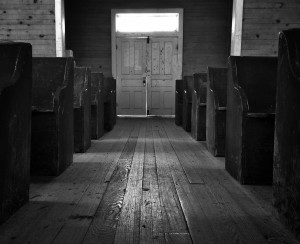
When I left church two and a half years ago, I expected that I’d eventually return. Certainly, I didn’t expect to return to the church I’d left, but surely, I’d end up back in church somewhere on a regular basis. I was naive to the amount of damage religion had caused in my life.
Growing up–and especially in my early twenties–I never believed I was good enough, and there was always another book to read on how to be a more godly woman, a better wife, a wiser mother. I remember reading one book by a Christian author which suggested that at the end of a day of mothering young children and ironing clothes and cooking dinner, wives should touch up their makeup and look fresh upon their husbands’ arrival home from work. In addition, those darling wives should give their husbands at least thirty minutes of quiet, down time before asking anything of them. Needless to say, I tried to be that wife, but it only took a couple of days before I felt like I might go insane from the pressure.
I wore myself out trying to implement suggestions and strategies to make myself more acceptable to God and to be more like the church ladies who appeared to be whole and holy. There was no end to the striving, and churches’ endless promotions for ladies’ Bible studies maintained the vicious cycle of despair and do-more.
I digress.
I can count on two hands the number of times I’ve been to church in the last two and a half years. This is staggering to me, someone who rarely missed attending church. One weekend, when my second child was only a few weeks old, my husband’s then-boss asked if he’d be willing to drive overnight to deliver a part to a customer in Charleston, South Carolina. We needed the money, and since neither of us had ever been to Charleston, we agreed to go. We left our oldest daughter with her grandmother, and drove through a Friday night, stopping every couple of hours for me to nurse our newborn. The boss had suggested that we spend Saturday in Charleston, and offered to put us in a hotel room Saturday night so we could drive back on Sunday. Not us. We were committed. We delivered the part on Saturday morning, then turned around and drove eight hours back home so we could be at church on Sunday morning.
My commitment and feelings of obligation to church, to God, to my religious beliefs ran deep, and so did the damage.
I’m still struggling with the effects of religion. I’m still going to therapy and attempting to resolve various hurts from a lifetime of damaging theology. My counselor recently listed off the stages of grief in reference to a different topic, and I realized I’d been grieving leaving church.
I think I was in denial long before I ever left church, yet I still wavered between numbness and shock for quite a while. I stayed angry–with church, with The Church, with God–for a nice, long time. I think I’d begun the bargaining step, too, before I ever left church: What if church were less judgmental? What if church was a place of grace? God, if you’ll just… Depression is the step where I pitched a tent and camped out: the crying, the loneliness, the sadness, the intense feeling of loss. Some days, I still bargain, and some days, I still deal with the depression. But most days, I think, I have reached a place of acceptance; however, my counselor stated that acceptance is now often being referred to as reconciliation. I suppose I’m far from being reconciled with church and religion.
However, I’ve found some helpful ways to cope and recover. If you’re dealing with the trauma that comes with leaving church (for whatever reason), I hope you find these suggestions useful:
- Don’t automatically start attending another church. Take a breather.
- Unfriend folks on social media who were associated with the trauma. If you feel badly about deleting them as friends, at least unfollow them so you don’t have to see their church posts in your feed.
- Write about your experience. So you’re not a blogger; write in your journal.
- Distract yourself when you are overwhelmed. Go to the gym or watch Netflix or read fiction or paint.
- Set boundaries. This one was huge for me. I always felt it would be rude if I didn’t allow people to express their opinions about my trauma. I was wrong! You don’t have to discuss your experiences until you’re ready.
- Quit listening to trigger music. Those worship songs I used to love to sing became a constant reminder of all the hurt. I found other music to enjoy.
- Don’t respond to people who want to chastise you but have never been in your shoes. You don’t owe those folks any answers. In addition, don’t take their criticism personally. It says more about them than you.
- Cry when you need to.
- List things you are doing well. I literally made a list one day of all the things I had accomplished that day just so I could see that I wasn’t falling apart.
- Go to therapy. It’s worth it.
- Put away the Christian books and Bible studies. Read some fiction or even a self-help book.
- Explore different beliefs. Nothing says you have to adopt a whole, new belief system, but open your mind to the fact that there are many different beliefs in the world which people hold as closely and devoutly as you held yours.
- Get out of your comfort zone. Do something new and make new friends.
- Find people who can empathize with your experience. It helps to have someone with whom you can discuss what you’ve been through. There are some great groups and resources online.*
- Quit reading your Bible and praying. Yep, I said it. I’m not suggesting you never read the Bible or pray again (assuming you want to), but I am suggesting that taking a break from them will give you space to heal.
- Quit waiting for an apology. You’re not likely to receive one.
- Be patient with yourself. The grief won’t last forever.
* Recovering From Religion, nakedpastor, Journey Free


